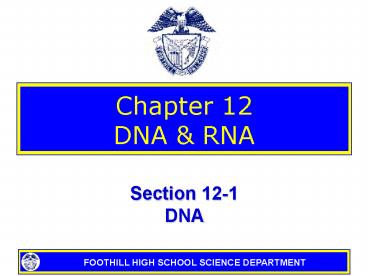Chapter 12 DNA - PowerPoint PPT Presentation
1 / 29
Title:
Chapter 12 DNA
Description:
Chapter 12 DNA & RNA Section 12-1 DNA Griffith & Transformation 1928 Studying Natural Bacterial Pneumonia caused by: Streptococcus pneumoniae Smooth (pathogenic ... – PowerPoint PPT presentation
Number of Views:69
Avg rating:3.0/5.0
Title: Chapter 12 DNA
1
Chapter 12DNA RNA
- Section 12-1DNA
2
Griffith Transformation
- 1928
- Studying Natural Bacterial Pneumonia caused by
- Streptococcus pneumoniae
- Smooth (pathogenic)
- Rough (non-pathogenic)
S. pneumonia in sputumNotice capsuleGram
Positive Diplococci
3
Streptococcus pneumonia
Type 3VERY Mucoid
OptochinDisc
4
Griffiths Experiments
- Injected Mice
- Smooth Mice Died
- Rough Mice Didnt Get Sick
- Heat Killed Smooth
- Mice Didnt Get Sick
- Illness Not Caused By Poison
5
Transformation
- Mixed Heat Killed Smooth With Rough Live
Bacteria. - Mice Died
- Autopsy Revealed Lungs Full Of Smooth Strain of
Bacteria - HOW??
6
Griffiths Transformation
7
Transformation
- Heat Killed Smooth Bacteria
- Still Contained The Information On How To Become
Smooth - And Could Transmit That Info
- And Transform Rough Bacteria To The Smooth
(Pathogenic) Form
8
Avery DNA
- 1944
- Repeated Griffiths Work
- But Treated The Extract From Heat Killed Smooth
Bacteria To Destroy Specific Types Of Compounds
9
Avery DNA
- Treated Extract To Destroy
- Proteins
- Lipids
- Carbohydrates
- RNA
- Transformation Still Occurred
10
Avery DNA
- Then They Treated Extract Destroyed DNA
- Transformation Did NOT Occur
- DNA Was The Transforming Factor
11
Avery DNA
- Key Concept
- Avery and other scientists discovered that DNA
stores and transmits the genetic information from
one generation of an organism to the next
generation.
12
Hershey-Chase Experiment
- 1952
- Studied Virus Particles, Especially Bacteriophages
Martha Chase Alfred Hershey
13
Hershey-Chase Experiment
- Bacteriophages
- Composed of DNA or RNA
- and a Protein Coat
- Figured Whichever Part Entered The Bacteria
Carried The Genes - Used Radioactive Markers
14
Radioactive Markers
- Grew Viruses In Cultures Containing
- Radioactive Phosphorus ( 32P )
- and
- Radioactive Sulfur ( 35S )
- Proteins Contain No Phosphorous
- DNA Contains No Sulfur
15
Radioactive Markers
- Therefore
- If The Interior Of The Bacteria Contained
- ( 32P ) Then DNA Contained Genes
- ( 35S ) Then Protein Contained Genes
Nearly All The Bacteria Contained ( 32P
) Therefore DNA Contained Genes
16
Hershey-Chase
17
Hershey - Chase
- Key Concept
- Hershey and Chase concluded that the genetic
material of the bacteriophage was - DNA, not Protein.
18
The Structure of DNA
- Scientists still didnt know
- How information was carried between generations
- How genes were structured
- How genes were copied
19
The Structure of DNA
- DNA is a long Molecule of repeating nucleotides
- Each nucleotide has 3 parts
- 5 Carbon Sugar (Deoxyribose)
- 1 Phosphate Group
- 1 Nitrogenous Base
20
The Structure of DNA
- There are 4 Nitrogenous Bases in DNA
- The 4 Bases fit into two groups or types
- Group 1 Purines
- Adenine
- Guanine
- Group 2 Pyrimidines
- Cytosine
- Thymine
21
Purines Pyrimidines
22
The Structure of DNA
- DNA Backbone
- Sugar Phosphate Groups
- Nitrogenous Bases
- Stick Out Join Sideways
23
The Structure of DNA
- Chargaffs Rules
- Discovered That Certain Nucleotides Were Always
Present In The Same Percentages - Adenine Thymine
- Guanine Cytosine
- In Each Species Different
- Nobody Knew Why
24
The Structure of DNA
- X-Ray Diffraction
- Early 1950s
- Rosalind Franklin
- Doesnt Show Structure But Provides Clues
- DNA Twisted In Coils
- Two Strands
- Nitrogenous Base In Center
25
Photo 51
26
The Double Helix
- Watson Crick
- Building 3Dimensional Models
- 1953 Saw FranklinsX-ray Work
- Immediately Recognized What The Structure Had To
Be - The Double Helix
27
Watson Crick
- Key Concept
- Watson Cricks Model of DNA was a Double Helix,
in which Two (2) Strands were wound around each
other.
28
Double Helix
29
Watson Crick
- Discovered The Double Helix
- Held Together By Hydrogen Bonds Between The
Nitrogenous Bases - Base Pairing
- AT and GC
- Explained Chargaffs Rule































